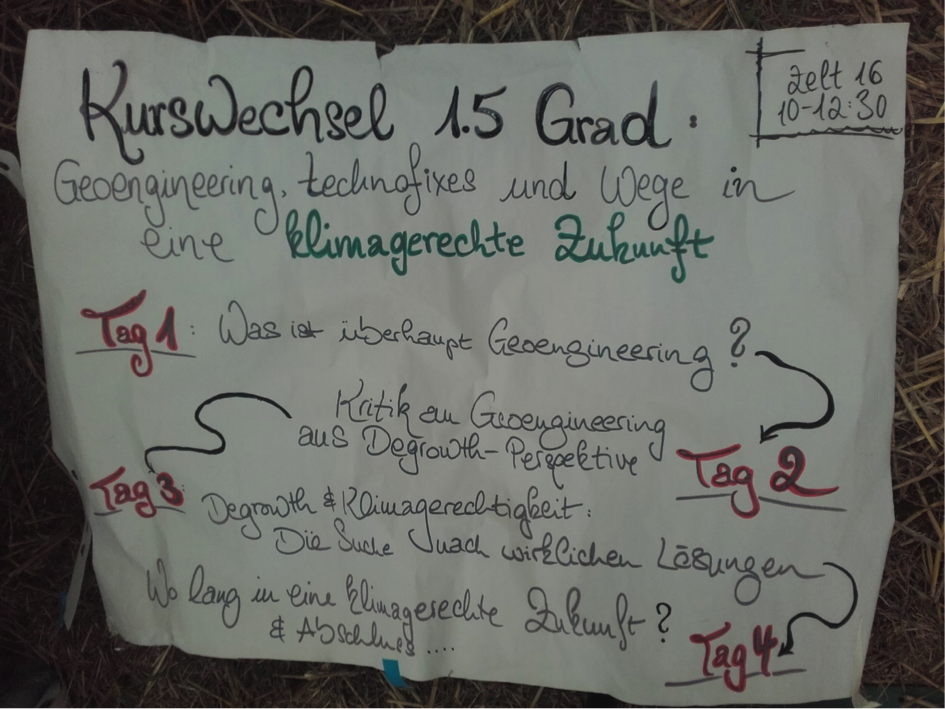By Nafeez Ahmed
Worried about the shit hitting the fan on climate change and other major crises? Good. Because those crises prove that civilization is in the midst of a phase shift to new forms – and we’ve got the opportunity, right now, to ride the wave of five interlinked revolutions in information, food, energy, finance and ethics, to co-create a new way of being that works for everyone.
In part 1, I pointed to the leading edge work of University of Turin economist Prof Mauro Bonaiuti on the deeper roots of the ongoing crisis of capitalism in a wider environmental crisis, where the ‘endless growth’ model of unlimited material accumulation is increasingly breaching natural and environmental limits of the biosphere.
Bonaiuti’s message though, far from being all doom and gloom, captures how this phenomenon is symptomatic of a shift in the very nature of civilization itself as it transitions to new social and political forms, as the limits of the biosphere enforce human practices to adapt to the consequences of breaching these limits. This ‘phase shift’ means we are on the brink of a fundamental change in the way civilization works, one that could have both positive and negative outcomes – depending on the choices we make as a species.
Here, I round up what I believe to be the five most significant ‘revolutions’ that constitute the positive components of this phase shift, and whose inexorable evolution and proliferation offer profound opportunities for systemic transformation that benefits humanity, and the planet: information, energy, food, finance and ethics.
The world is currently, quite clearly, at the dawn of a huge technological revolution in information that has already in the space of a few years transformed the way we do things, and is pitched to trigger ongoing changes in coming decades. A glimpse of some of those changes, and the possibility of weaponizing them, can be found in my report on the Pentagon’s plans for defense reform.
The main impact of the information revolution so far has been the decentralization of communications infrastructure across the world, the increasing interconnection of different countries and communities, and as a consequence, the opening up of myriad sources of information, often for free, to the public.
Of course, this is no global village. Access to the internet remains massively unequal between rich and poor, and new battle-lines have been drawn–illustratedby the impunity and unaccountability of mass surveillance by intelligence agencies in cahoots with corporations, as well as ongoing efforts by telecoms giants and governments to explore ways of controlling and censoring the internet.
But this is largely a regressive response to the increasing inability to control the inherently uncontrollable and decentralized dynamic of the information revolution. We now know that intelligence agencies are playing catch-up as it’s become clear that social media can be an enabler of radical political messaging and, thus, an amplifier for social movements capable of facilitating the toppling of repressive military regimes that happen to be our closest allies (Egypt, anyone?)
Similarly, the attempt to shut-down PirateBay has been futile. The moment legislation was introduced to shut down the site, instead of disappearing, hundreds of PirateBay mirror sites proliferated in a manner demonstrating the literal impossibility of ever being able to eliminate the flagship pirating portal.
It is this freedom of information (both in accessibility and cost) that is also eating into the traditional business models of the broadcast and print media.
Those models are walking dead. The next generation does not read newspapers, and they don’t watch TV news. They get their info from YouTube shows, curate their news from across multiple mainstream and alternative news sites, share and communicate across Facebook, Twitter, Instagram, Whatsapp, Snapchat, Vine, Tumblr, and so on. And this is a big reason why the conventional business models of the mainstream media are experiencing rapid decline.
Despite its pitfalls, the information revolution has thus opened up previously unthinkable opportunities for alternative media, accessibility of information, and interconnections between different people, communities, social movements, and nations. This is already undermining the relevance of traditional centralized information highways, and creating space for public engagement, and it’s a process that will only accelerate and become increasingly unstoppable as encryption and privacy tools become cheaper and more common.
As I’ve shown elsewhere, the fossil fuel system is already in its death throes. Costs of production have rocketed for oil, gas and coal, and the market simply cannot afford to pay prices high enough for the big fossil fuel majors to sustain increasing profits.
Mark Lewis, former head of energy research at Deutsche Bank, points out that the industry is investing “at exponentially higher rates for increasingly small incremental yields of energy.”
This year the US Energy Information Administration found that as a consequence of this shift to expensive energy, the world’s leading oil and gas companies were sinking into a debt-trap even before the latest oil price crash. Their net debt increased by $106 billion in the year up to March, while they sold off $73 billion of assets to cover surging production costs. “Alarm bells are ringing. Investors can see that this is unsustainable,” Lewis told The Telegraph last month. “They are starting to ask whether it wouldn't be better to return cash to shareholders, and wind down the companies.”
As the fossil fuel empire crumbles, in contrast, the cost of renewable energy technologies especially solar and wind is dramatically falling even as efficiency gains are rapidly increasing. According to Silicon Valley entrepreneur and Stanford business studies lecturer Tony Seba, who forecasts the dominance of solar within just 15 years, the energy returned on energy invested (EROIE) of solar is far superior over the long-term than fossil fuels.
As we wean ourselves off fossil fuels, one of the most energy intensive pursuits ripe for transition is industrial agriculture. In the US alone, 19 percent of fossil fuel consumption goes to the food system for pesticides, fertilizers, on-site machinery, processing, packaging and transport. But as industrial agriculture continues to degrade the soil, the productivity of land in key food basket regions is steadily declining.
With global food prices at record levels in the context of these challenges, combined with the pressures of climate-induced extreme weather, volatile oil prices, and speculation by investors, the incentive to develop greater resilience in locally accessible food production is also growing.
In the UK and US, for instance, demand for locally grown food production is rising fast. The US Department of Agriculture reports that between 1992 and 2007, demand for local produce grew twice as fast as total agricultural sales, and the number of locally-sourced food outlets has quadrupled from 1994 to 2013.
Transition initiatives across the western world are pioneering community efforts to grow their own food, organically and outside of the industrial food system. Preliminary studies show that the relocalization of food economies is a viable option that could have huge benefits to local economies and create a wide range of jobs – although this would involve less meat consumption, with greater numbers of people living on and working the land.
Recently, the UN Food and Agricultural Organization (FAO) has been exploring the potential to scale-up agroecology – a specialized farming method which combines organic agriculture with an ecologically-conscious social, economic and political structure. Successive UN special rapporteurs on the right to food, drawing on a rich peer-reviewed literature, have endorsed agroecology as a viable solution for increasing crop yields for the small farmers that provide 70 percent of global food production.
A Masters thesis in Environment and Planning completed this year by Zainil Zainuddin, a food and agriculture researcher at RMIT University in Melbourne, Australia, conducted a case study of 15 households doing urban farming on a collective plot in Melbourne city of 1,096 square meters. Eleven of the participating households farmed using permaculture design principles, including no-dig, raised beds for food growing, the use of compost and/or worm-farm castings for soil improvement (and the use of animal manure for those engaged in poultry or fowl raising), companion planting for organic pest management and rainwater harvesting. In one year, the project produced a total yield of 388.73 kilograms (kg) worth of fruits, vegetables, nuts, honey and meat, along with a total of 1,015 eggs. The study found that, “All participants register a surplus of between 5 per cent to 75 per cent, depending upon the crops and seasons,” which was shared among “immediate family, and local communities” through local swap and share networks.
In ensuing years, more and more food will be grown locally in both urban and rural environments, as the industrial food system becomes more unsustainable and costly.
The information, food and energy revolutions are being facilitated by a burgeoning revolution in finance. Once again, the emerging trend is for new models that give greater power to the crowd, and undermine the authority and legitimacy – and even necessity – of the traditional, centralized banking infrastructure.
This has been enabled by the information revolution. According to the technology market research firm Forrester, the avalanche of new mechanisms for potential lenders and borrowers, or funders and receivers, to interact online without the intermediation of traditional banks and financial institutions, poses a huge threat to the banking establishment. Of these new mechanisms, peer2peer lending has experienced particularly rapid growth.
Forrester Research’s new report shows that since 2005, over $6 billion has been generated in loans in such social lending sectors. Although peer2peer remains tiny in the context of banks’ larger balance sheets, Forrester forecasts that the long-term trend is for these new forms of social lending – including digital investment management and crowdfunding – to continuously grow “chipping away at banks’ profits, diverting deposits, and disintermediating banks.”
As the Australian Business Review recently noted, “banks have now been brought to the edge of the disruption abyss” where “the media, mail and music businesses” are already on the verging of toppling over. These new social lending and finance mechanisms will “break the business of banking into its parts, each with its own set of disrupters.”
This has also opened the way for new digital currencies, which many forecast will disrupt billions of dollars a year in banking, especially in less developed markets where banking infrastructures are not well established. While BitCoin is often the most hyped, others are quickly emerging which promise greater stability, transparency, and public accountability, such as MaxCoin and StartCoin.
Perhaps the most profound shift of all, implicit in these seemingly disparate, but inherently interwoven revolutions, is the ethical revolution.
The old paradigm, which is facing increasing disruption by the emerging revolutions described above, is premised on a model of centralized, hierarchical control focused on unlimited material accumulation, and premised on the values of individualism, self-interest, competition, and conflict.
The model that is fast disrupting this paradigm from within, is premised on open access to information; distributed and effectively free, clean energy; local, community and democratic ownership over planetary resources; and a form of prosperity and well-being that is ultimately decoupled from the imperative for endless material accumulation.
The old and new paradigms can be clearly related to two quite different value-systems. The first paradigm, which is currently in decline, is that of egoism, crude materialism, and selfish consumerism. It is a value-system that, we now know from our best scientific minds, is on course to potentially lead to an uninhabitable planet, and thus, perhaps even species extinction. This suggeststhat this value-system is actually dislocated from human nature, our biophysical environment, and the relationship between them.
In contrast, a value-system associated with the emerging paradigm is also supremely commensurate with what most of us recognize as ‘good’: love, justice, compassion, generosity. This has the revolutionary implication that ethics, often viewed as ‘subjective’, have a perfectly objective and utilitarian function in the fundamental evolutionary goal of species survival. In some sense, ethics provide us a way to begin to glimpse the flaws in the old paradigm, and the opportunities for better social forms.
As these five revolutions accelerate and disrupt the old paradigm, as they are already doing –increasingly provoking the eruption of social movements that challenge and overthrow states and systems – the phase shift to a new era also accelerates. The birth pangs of this new era are premised on the escalating disruption of the old paradigm, a process that invokes chaos, uncertainty, and violence. Yet it is precisely in the ashes of that great disruption that the opportunities for these revolutions to take flight will become ever greater.
_________________ Nafeez Ahmed is currently setting up the people-powered independent media platform "Insurge Intelligence: Watchdog Journalism for the Global Commons"
Given the strategic indeterminacy of the degrowth movement that has been discussed in earlier articles within this series, we will consider the role that policy may play within the broader scope of a degrowth transformation and as one important focus within a plurality of movements. Specifically, working to move the focus of policy towards instruments that shift the rules of the competitive env...

Linda Schneider reflects on Geoengineering Monitor about a workshop on geoengineering from a degrowth and climate justice perspective at Degrowth Summer School in Rhineland, Germany: http://www.geoengineeringmonitor.org/2017/09/workshop-geoengineering-from-a-degrowth-and-climate-justice-perspective/ Geoengineering Monitor aims to be a timely source for information and critical perspect...

Middle-Europe's prosperity as well as our high levels of mobility and consumption are based on three industrial revolutions whose technical progress has constantly been increasing labour productivity. The consequences are paradoxical: On one hand it is possible to produce ever more goods with the same amount of work. On the other hand these productivity increases are being used to make human la...